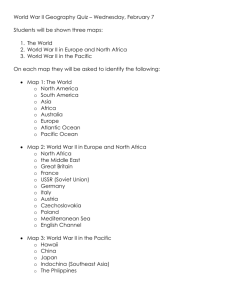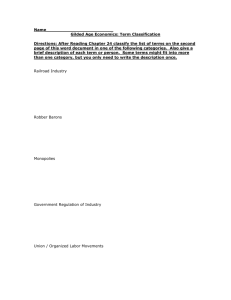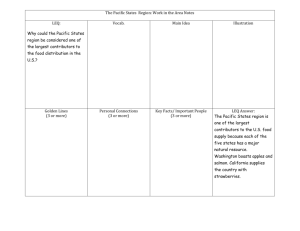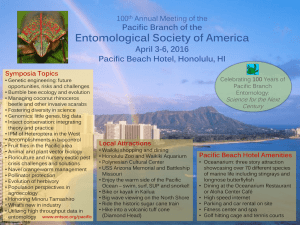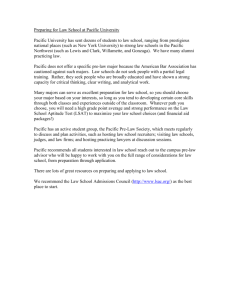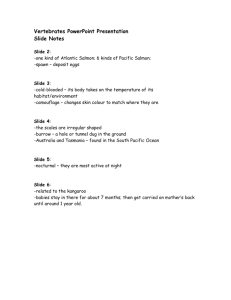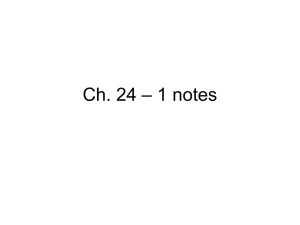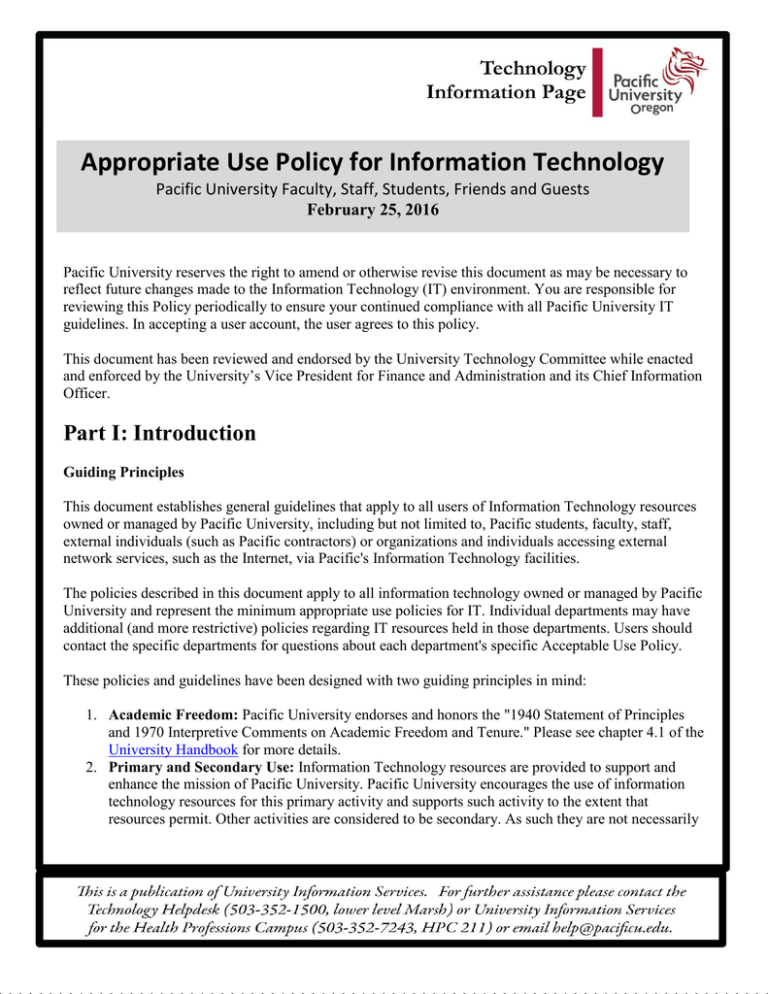
Appropriate Use Policy for Information Technology
Pacific University Faculty, Staff, Students, Friends and Guests
February 25, 2016
Pacific University reserves the right to amend or otherwise revise this document as may be necessary to
reflect future changes made to the Information Technology (IT) environment. You are responsible for
reviewing this Policy periodically to ensure your continued compliance with all Pacific University IT
guidelines. In accepting a user account, the user agrees to this policy.
This document has been reviewed and endorsed by the University Technology Committee while enacted
and enforced by the University’s Vice President for Finance and Administration and its Chief Information
Officer.
Part I: Introduction
Guiding Principles
This document establishes general guidelines that apply to all users of Information Technology resources
owned or managed by Pacific University, including but not limited to, Pacific students, faculty, staff,
external individuals (such as Pacific contractors) or organizations and individuals accessing external
network services, such as the Internet, via Pacific's Information Technology facilities.
The policies described in this document apply to all information technology owned or managed by Pacific
University and represent the minimum appropriate use policies for IT. Individual departments may have
additional (and more restrictive) policies regarding IT resources held in those departments. Users should
contact the specific departments for questions about each department's specific Acceptable Use Policy.
These policies and guidelines have been designed with two guiding principles in mind:
1. Academic Freedom: Pacific University endorses and honors the "1940 Statement of Principles
and 1970 Interpretive Comments on Academic Freedom and Tenure." Please see chapter 4.1 of the
University Handbook for more details.
2. Primary and Secondary Use: Information Technology resources are provided to support and
enhance the mission of Pacific University. Pacific University encourages the use of information
technology resources for this primary activity and supports such activity to the extent that
resources permit. Other activities are considered to be secondary. As such they are not necessarily
prohibited or even discouraged. However should such secondary activities in any way interfere
with primary activities, they may be terminated, whether or not such activities are explicitly
detailed in the information technology policy statements.
Examples of primary uses:
1. Communication with others in support of teaching, scholarly, service, and administrative
activities (professional email and associated applications, web page management, social
networking applications, etc.)
2. Completion of coursework and course management activities
3. Preparation of academic papers and projects and conducting scholarly activities
Examples of secondary uses:
1. Non-academic activities such as personal electronic mail (email), web page creation,
watching online content for entertainment purposes, and/or web browsing
2. Online gaming (including game consoles such as Microsoft® Xbox, Playstation®, etc)
Individual Rights
Pacific University respects and promotes individual rights to privacy, equitable and fair access to
resources, intellectual property, real property, and civil rights. Activities which threaten these rights are
prohibited and may be terminated, whether or not such activities are explicitly detailed in the information
technology policy statements.
Information Technology Resources at Pacific University
Information Technology at Pacific University encompasses the use of all campus computing,
telecommunications, document services, educational media, and management information systems
technologies. These IT resources support the instructional, research, and administrative activities of the
university. Examples of these resources include, but are not limited to, the central administrative,
academic and library computing facilities; the campus-wide data, video and voice networks; electronic
mail; video conferencing systems; access to the Internet; voice mail; the university switchboard; fax
machines; photocopiers; classroom audio-video; departmental and general use computing facilities and
related services.
Appropriate Use of IT Resources
Pacific University campus computing facilities and network are provided as a service to students, faculty,
staff, administration, and other members of the university community to support the mission of the
-2-
university. The university strives to provide fair and distributed access to computing and network
facilities for a large number of users. Proper use follows the same standards of common sense, courtesy,
and restraint in the consumption of shared resources that govern the use of other campus facilities.
Improper use violates those standards by preventing others from accessing shared facilities.
Part II: Guidelines for Appropriate Pacific IT Use
The following list, while not exhaustive, provides some specific guidelines for appropriate IT use:
1. Authorization: Use only the Information Technology facilities for which you have specific
authorization. Do not use another individual's PUNet ID or account, or attempt to capture other
users' passwords. Users are individually responsible for all use of resources assigned to them;
therefore, sharing of PUNet accounts is prohibited.
2. Facilities: Observe established guidelines for any information technology facilities used both
inside and outside the university. For example, individuals using Pacific's computer resource
centers must adhere to the policies established for those centers; individuals accessing off-campus
computers via external networks must abide by the policies established by the owners of those
systems as well as policies governing use of those networks. Contact the Technology Information
Center for more information about specific departmental IT policies.
3. Alter, Delete or Destroy: Do not attempt to inappropriately alter, delete or destroy any hardware
or software on any Pacific IT system. This constitutes a violation of appropriate use of IT facilities
no matter how weak the protection is on those products.
4. Plagiarism: Because electronic information is volatile and easily reproduced, respect for the work
and personal expression of others is especially critical in computer environments. Violations of
authorial integrity, including plagiarism, invasion of privacy, unauthorized access and trade secret
and copyright violations, may be grounds for sanctions against members of the academic
community.
5. Illegal Downloading: The official Pacific University position on peer-to-peer (P2P) file sharing
utilities (e.g., Ares, BitTorrent, Transmission, uTorrent, etc.) is that the software itself is not
illegal, nor banned by Pacific University. It is illegal, however, to download or share copyrighted
material for which you do not hold the copyright. While Pacific University does not explicitly
track the downloading of files, in the event the university receives notification of illegal
downloading activity, appropriate investigation and disciplinary action to address the violator will
be taken. See the university's statement on copyright for full details. Members of the Pacific
community are encouraged to take advantage of the legitimate sources of digital content found on
the EDUCAUSE web site at http://www.educause.edu/legalcontent.
6. Appropriate Standards: Use appropriate standards of civility and common sense when using IT
-3-
systems to communicate with other individuals. Do not use email to transmit confidential
information relative to personnel matters, internal investigations and litigation. Intentionally
misrepresenting yourself while using IT systems is prohibited. If necessary, you are required to
identify your true identity. Anonymous postings are allowed, as long as they follow the
established rules and standards of the hosting site. Using Pacific's IT resources to harass, threaten,
slur, embarrass, libel, or demean other individuals is explicitly prohibited.
7. Volume Usage: Moderate use of public IT resources. Pacific University has a large and growing
body of faculty, staff, students, and alumni, all of whom need access to IT resources. There may
be times when these resources are in high demand, and as such, you should limit use of public IT
resources to primary purposes only.
8. Electronic Image Usage: Faculty, staff and students must obtain written consent for the right to
reproduce, use, exhibit, display, broadcast, distribute and/or create derivative works of universityrelated photographs or other recorded images of individuals for use in connection with the
activities of the university or for promoting, publicizing or explaining the university or its
activities. In addition, the publication and dissemination of images and photographs of Pacific
University students through Pacific’s IT equipment and resources must comply with the Family
Educational Rights and Privacy Act (FERPA). FERPA Privacy Guidelines may be found at
http://www.pacificu.edu/about-us/offices/registrar/privacy-confidentiality.
Pacific University reserves the right to use any photographs or other recorded images of public
events on or off campus for publication and promotional purposes. This grant includes, without
limitation, the right to publish such images in the university’s student newspaper, alumni
magazine, on the university’s Web site, and public relations/promotional materials, such as
marketing and admissions publication. These images may appear in any of the wide variety of
formats and media now available to the university and that may be available in the future,
including but not limited to print, broadcast, videotape, CD-ROM and electronic/online media.
Persons in attendance at university events are likely to be photographed or otherwise recorded;
while reasonable efforts will be made by the University to avoid publication and promotional use
of images of individuals who have submitted a Notice of Revocation of Promotional Release, the
University cannot guarantee that their image will not be used.
Appropriate release forms are available upon request from University Advancement.
http://www.pacificu.edu/about-us/offices/marketing-communications/photography-multimedia.
-4-
Part III: Users' Rights
1. Access to Information Technology (IT) Resources
Central IT Resources
Undergraduate and graduate students, faculty, administrators, staff and recognized student organizations
may obtain IDs for use with the central IT activities related to instruction, research or university
administration.
In the event that any faculty, administrator or staff person leaves, resigns or in any way concludes his or
her relationship with Pacific University for whatever reason:
1. Access to all IT resources, including voice mail and email services, will be terminated
within 45 days or immediately (if requested by the appropriate parties).
2. All electronic storage will be deleted when access is removed.
3. Faculty and staff may be able to arrange to have subsequent electronic
communications forwarded to an off campus account until the account is terminated.
Graduates and previous students (not graduating from Pacific University) are entitled
to life-long myAccount, PUNet ID, PUNet Password and BoxerOnline access. Graduates are also entitled
to retain a Pacific email address. Access to other campus resources, such as library databases, postgraduation is not granted.
Other IT Resources
Most of Pacific's IT facilities and services—such as the computer-equipped classrooms, video
conferencing rooms, consulting services, voice mail, and training—are available only to members of the
university community and authorized guests. UIS is responsible for planning and budgeting for central IT
services. For more detailed information about access to any facility or service, visit the UIS home page at
http://www.pacificu.edu/uis/, email help@pacificu.edu, phone UIS Helpdesk at 503-352-1500 or UIS
Hillsboro at 503-352-7243, or visit the Technology Helpdesk on the Forest Grove campus (Marsh Hall
LL6) or the University Information Services at the Hillsboro Campus (Creighton Hall 211).
-5-
Departmental IT Resources
For information concerning access to departmental IT resources, contact your department chair.
Remote Access to IT Resources
Secure access to University information from off campus locations using Virtual Private Network (VPN)
connections to the Pacific University internal network are allowed when browser based access is not
available. For more detailed information about VPN Policy and access, contact University Information
Services at help @ pacificu.edu.
Residence Hall IT Resources
For many undergraduate students, campus residence halls represent their primary living quarters during
part or all of their time at Pacific University. While it is important to address recreational needs of Internet
usage, such as online computer gaming, networked game consoles, and other social activities, these are
secondary to the academic needs of the university. UIS will work to maintain these resources to the best
of their ability; however academic needs, including bandwidth usage, will take priority. For questions,
please contact the Technology Information Center or Student Life.
2. Data Security and Integrity
UIS-Maintained Equipment
UIS provides reasonable security against intrusion and damage to files stored on the central IT facilities.
Neither the university nor any IT staff member can guarantee protection against media failure, fire, floods,
etc. Neither can UIS guarantee protection from unauthorized access of personal data on University IT
facilities. Users should use all available methods to protect their files, including the frequent changing of
their passwords and storing back-up copies of information. In the event that data have been corrupted as a
result of intrusion, UIS should be notified immediately. Every reasonable attempt will be made to restore
files to their status prior to intrusion; however, UIS cannot guarantee restoration.
Department IT Equipment
Upon request, the IT staff will assist in implementing procedures to maximize individual user security.
Although UIS backs up some departmental servers at departmental requests and makes reasonable
attempts to protect those servers from intrusion, it does not provide the same level of protection or offer
-6-
restoration of files stored on all departmental servers. Therefore, it is especially important that each
department has a back-up strategy and security plan for their IT resources. UIS will consult on those plans
upon request.
University Bandwidth Management
University Information Services reserves the right to manage the University's voice, data and video
bandwidth allocation as they see fit. Criteria for bandwidth management involves the integrity and
robustness of University-owned equipment, data, and services as well as the appropriateness of bandwidth
use when compared to the University's academic goals, administrative missions, and appropriate use
policy for information technology.
3. Privacy
Access by IT Staff on Behalf of the University
The University respects the privacy of all users. Members of the UIS organization are forbidden to log on
to another user's account or to access a user's files unless the user gives explicit permission (for example,
by setting file access privileges). Exceptions to this privacy policy are made, however, under specific
conditions. Such conditions include investigation of computer programs suspected of causing disruption
to the network or other shared services; investigation of suspected violations of state or federal law or
university policies; and investigations to avoid liability or in connection with internal hearings or
litigation. In these instances, the Chief Information Officer (CIO), upon consultation with The Vice
President for Finance and Administration, must be convinced that there is sufficient cause to review files
before those files can be searched without the user's permission.
Before logging onto a user's account or accessing a user's private files, a reasonable attempt will be made
to contact the user to inform him or her that UIS will access the files. If that is not possible, the CIO will
view the files for the suspected violation and will inform the user afterward that the files have been
reviewed. The CIO will retain a fully documented report of the violation and the process of searching
these suspected files. Information obtained in this manner is admissible in legal proceedings or in a
University hearing.
-7-
Access by Administrators of Departmental IT Systems
Individual departments must have guidelines consistent with university policy and federal law which deal
with access issues of their IT resources.
Users should not expect privacy of any electronic communications
IT systems' administrators may see the contents of electronic communications due to serious addressing
errors or as a result of maintaining the communications system. In those cases where administrators do
see the contents of private electronic communications, they are required to keep the contents confidential.
Users should be aware that the current design of the networks is such that the privacy of electronic
communications cannot be guaranteed.
4. Ownership of Copyright for Materials Developed with Pacific's Resources
Pacific University has established guidelines related to ownership of copyright property. The exact
policies and procedures relating to copyrights may be obtained from the Office of Academic Affairs.
http://www.pacificu.edu/faculty-staff/documentation-and-forms/copyright-basics/copyright-usageguidelines
5. Responsibility for Errors in Software, Hardware, and Consulting
UIS, in conjunction with department points of contact, makes its best effort to maintain an error-free IT
environment for users and to ensure that the IT staff is properly trained. Nevertheless, it is impossible to
ensure that IT system errors will not occur or that IT staff will always give correct advice. Pacific
University presents no warranty, either expressly stated or implied, for the services provided. Damages
resulting directly and indirectly from the use of campus resources are the responsibility of the user.
However, at the request of the user, when errors are determined to have occurred on IT facilities,
members of the IT staff will make a reasonable attempt to restore lost information to its state prior to the
failure, at no cost to the user. As part of maintaining the IT environment, the IT staff applies vendorsupplied or locally developed fixes as appropriate when problems are identified. Given that vendors may
be involved and that staff resources are finite, no guarantee can be made as to how long it may take to fix
an error once it has been identified.
When software errors are considered major problems or could produce inaccurate results, users will be
notified as soon as possible using appropriate electronic and/or other media
-8-
6. Changes in the Pacific IT Environment
When significant changes in hardware, software or procedures are planned, UIS will notify the affected
departments/business units. The affected departments/business units will then notify their departmental
user community through email and other media to ensure that all users have enough time to prepare for
the changes and to voice any concerns that they might have.
7. Policy Violations
Material violations of the Appropriate Use Policy for Information Technology including, but not limited
to violations of the Appropriate Standards provided in this Section, will subject Faculty, Staff and
Students to disciplinary action which, in addition to termination of access to IT resources, could lead to
dismissal or termination of employment. For further reference, see:
University Handbook Chapter 4;
Student Code of Conduct;
Staff Code of Conduct, Confidentiality of Records Agreement & Acknowledgment of Pacific
University Policies and Procedures; and
Staff Handbook Section A.37
8. Comments, Suggestions, Corrections, etc.
Questions concerning this or any other Information Technology policy can be directed to
cio @ pacificu.edu.
9. Revision History
Original policy created March 4, 2009.
Revised and approved by the University Technology Committee November 17, 2011
Revised and approved by the University Technology Committee February 25, 2016
Copyright © Pacific University Oregon, all rights reserved.
Direct comments or questions to help@ pacificu.edu.
-9-

